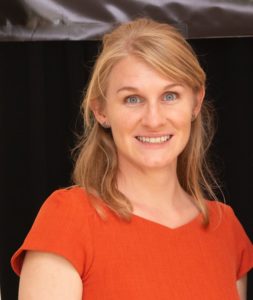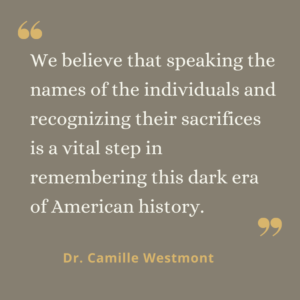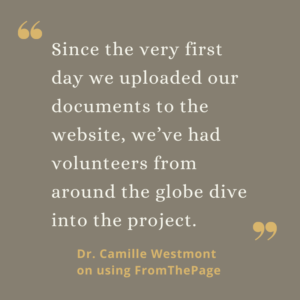Dr. Camille Westmont, Visiting Professor of History at the University of the South, kindly spoke with Sara Brumfield about the Convict Leasing Project, and her experience using FromThePage.
First, tell us about your documents.
The documents we are working to transcribe are the prison records from the Lone Rock Stockade. The Lone Rock Stockade was a private prison built by the Tennessee Coal and Iron Company (TCI) near Tracy City, Tennessee, to house the convict laborers TCI had leased from the state. Under the convict lease system, which was widespread across the American South following the Civil War, white business owners could lease state prisoners (who were primarily African American) and force them to work without pay and under threat of physical of violence. Many Southern states passed racially-targeted laws with the intent of imprisoning African Americans in order to improve state revenues by selling their labor under the convict lease system. The convict lease system was so brutal and fatal that in 1893, Frederick Douglass called the convict lease system “a worse slavery than that from which [enslaved people] had been liberated.” The convict lease system was recently in the national spotlight when the bodies of these imprisoned individuals were unearthed in Sugar Land, Texas, in 2018.
The Lone Rock Stockade played a major role in the convict lease system in Tennessee. It was the largest convict stockade in the state and was in operation for almost the entirety of convict leasing in Tennessee. Thousands of people—men, women, and children—were sent to the Lone Rock Stockade where they were forced to work in coal mines and in coke ovens. Because the individuals sent to the Lone Rock Stockade were state prisoners, their names were recorded in state ledgers. We are currently transcribing those ledgers in order to remember the names of the people victimized by the convict lease system and systemic racism. We have a total of nine ledgers, three of which are currently transcribed.
What are your goals for the project?
This transcription project is part of a larger archaeological research project. When COVID-19 made excavations at the Lone Rock Stockade site impossible, we shifted our focus entirely towards the documentary record associated with the stockade. That shift in focus has paid off tremendously, both through the ability for community members to be personally involved in the research through transcribing as well as through allowing us to delve more thoroughly into a rich (but extensive) set of documents.
Our goals are to transcribe the names of the thousands of individuals who were imprisoned at the Lone Rock Stockade. Although the Lone Rock Stockade was one of over a dozen such private prisons in the state, we are focusing on the Lone Rock Stockade in order to highlight the brutality of one place within a state-wide and region-wide practice. We have already documented the names of over 2800 individuals through our work.
Ultimately, these records will serve two purposes: as the impetus for a memorial to these imprisoned individuals at the site of the Lone Rock Stockade, and as a resource for genealogy, particularly African American genealogy. We believe that speaking the names of the individuals and recognizing their sacrifices is a vital step in remembering this dark era of American history. Our transcription efforts so far have shown that over 80% of the names transcribed belonged to African Americans. Given the difficulties people often encounter while conducting genealogical research on African American communities, these documents could serve as a resource for modern descendant communities.
How are you recruiting or finding volunteers/collaborators?
Given the subject matter, we’ve received an outpouring of community support and interest in getting involved with the work. We are associated with the Roberson Project at the University of the South, so we have also garnered interest through their networks. Ultimately, however, our most successful recruiting tool has been Transcribe-a-thons with small groups and organizations. Organizing a Transcribe-a-thon allows people to learn about the history behind the records and helps build transcribers’ confidence in their skills by allowing them to ask questions or get a second opinion in the moment. Plus, it’s fun!
Can you share your experience using FromThePage?
My experience has been resoundingly positive. Since the very first day we uploaded our documents to the website, we’ve had volunteers from around the globe dive into the project. Additionally, using FromThePage provides a centralized place where I can send volunteers who are interested in transcribing, where I can answer questions quickly and easily, and where I can track progress on the project Previously, I had been emailing chunks of records to people who were interested in transcribing, which was an extremely inefficient, difficult to track, and overly stressful method. Using From the Page has streamlined my entire operation and greatly improved the quality and speed of our transcriptions.
How does FromThePage & crowdsourcing fit within traditional history research?
For my project, FromThePage is allowing us to translate these vitally important documents into a usable form. The thousands of individual prison records are a wealth of information, but are utterly impossible to analyze in their original format. Transcribing allows this data to become searchable, readable, and analyzable. From the Page plays a prominent role in that transformation because I never would have been able to transcribe all of these records without the help of the dozens of volunteers who have assisted us so far. FromThePage is expanding what I can do with these documents, including making them more accessible for the general public.
What would you tell folks considering a similar project?
I would strongly advise people to seriously consider Ben and Sara’s advice about hosting Transcribe-a-thons and setting up a newsletter. As I mentioned, the Transcribe-a-thons have been great for helping us to build a community around these documents—people who have different interests in them, but who all care deeply about making this history known. Transcribe-a-thons have also been amazing for productivity; at some Transcribe-a-thons, we’ve transcribed nearly 1000 new names in just an afternoon. I admit that I was skeptical at first, but I’ve grown to really love the interaction and chance to connect with people from across the country and the globe.
Secondly, the advice about the newsletter has been great. Doing a bi-monthly newsletter helps me stay aware of the progress of the transcriptions and it gives me an opportunity to praise our volunteers for their achievements. It has also helped me recognize how far we’ve come in such a short period of time. The newsletter has also helped to expand our community as people share it across their networks.
Anything else you'd like to tell us?
I have greatly enjoyed coming together with a diverse group of people over the FromThePage platform. It has been an excellent opportunity to expand my own perspectives on these documents while we work towards remembering the people recorded in the documents.
Check out Dr. Camille Westmont's projects on FromThePage:




